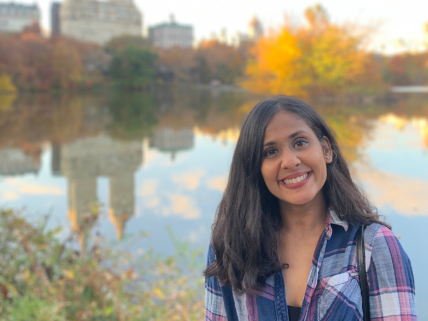Student Spotlight: Mahima Sharda (MPA 2022)

What motivated you to attend the Wagner School of Public Service?
There are, of course, so many reasons – being able to live in New York, the incredible faculty, and the unique classes on offer – but I think that one “eureka” moment came sometime while I was working with the United Nations Development Programme in Mumbai. Here, I was working on a research project surveying female waste pickers living in the city’s many informal dwellings. I was struck by the stark inequity faced by these individuals, because they were poor, but particularly because they were women. I began to think more critically about gender issues, and began to see instances of how they affected me personally as well. I had found my passion. I then saw studying at NYU Wagner as a means to gain the necessary set of skills through which I could convert my strong desire to empower women and girls into a tangible, lasting impact.
Can you tell us about a course, professor, or mentor at Wagner that was impactful?
It’s hard to pick just one. I’m constantly amazed by how kind and approachable Wagner’s professors are, on top of how much they’ve accomplished as academics and public servants. However, for me, Professor John Gershman, with whom I had the privilege of taking four classes, stands out. Upon finding out about my passion for gender equality issues, he offered to supervise my independent study at the intersection of gender and development assistance which I undertook as a Gallatin Global Human Rights Fellow. He always has terrific book recommendations and is practically an encyclopedia on all things public administration. Most importantly though, Professor Gershman’s deep sense of care for Wagner, its students, and their long-term success is constantly evident. As with so many other students, he is perpetually willing to make time to give career advice, to talk about current issues in the field, or to help with anything you might need. Frankly, I can’t imagine Wagner without him.
You’re currently working with the International Crisis Group, a notable international nonprofit, what are your responsibilities and what do you enjoy about it?
I held two roles at the International Crisis Group, a think tank focused on peacebuilding efforts, as an intern and then subsequently as a consultant. First, I worked in nonprofit development, through which I learned about how nonprofits are funded, and how their research is ultimately used to inform policymakers and decision-makers. It was neat to get a bird’s eye view of the organization, and as a teaching assistant for Wagner’s Financial Management course, it was interesting to see some of the concepts I’d worked on for that class applied in a real-world situation.
I then worked with Crisis Group’s gender department, conducting research on women, peace, and security issues. It was an unparalleled opportunity to finally work in the field I had originally come to Wagner for. Here, I had a chance to use some of the analytical and drafting skills I gained in school. I also gained a stronger understanding of contemporary topics pertaining to this subject such as sexual violence in conflict zones, feminist foreign policy, and the involvement of women in peacebuilding efforts.
The best part of working at Crisis Group though has been how supportive, nurturing, and genuinely concerned with my personal development the team has been – even after my eight month stint with the organization has ended.
Reflecting on your experience at Wagner, what skills / lessons from grad school are you taking into the next chapter of your career?
Prior to starting grad school, my practical experience in public service involved groundlevel operations and implementation. My time at Wagner has encouraged me to think bigger. The classes I have taken have taught me to think critically about the field at large and have helped me understand more theoretical, fundamental aspects of public administration. I’ve been thinking about contemporary debates in development, like the decolonization of aid or how programming in poorer countries can be designed to be more inclusive for women and girls. I hope to use this “big picture” thinking to broaden the scope of my impact, and to bring novel ideas to the roles I have in my career.
What advice would you give to current Wagner students who want to engage with public service?
One of the biggest lessons I’ve learned over the past two years is how important it is to build a network, both internally at Wagner, but also externally at the organizations you may have an interest in one day working with. Second, I’ve learned never to be shy in asking questions, and in boldly asking when you need something from someone. I’ve been so fortunate to meet amazing individuals who are willing to lend a helping hand or to provide me opportunities simply waiting to be asked. Lastly, at Wagner, I learned about innumerable challenges in public service we need to tackle, new geographies to consider, and alternative viewpoints to debate. I therefore think it’s important to enter every conversation, reading, event, and class with an open mind – you might just find the cause you commit yourself to for the rest of your life!